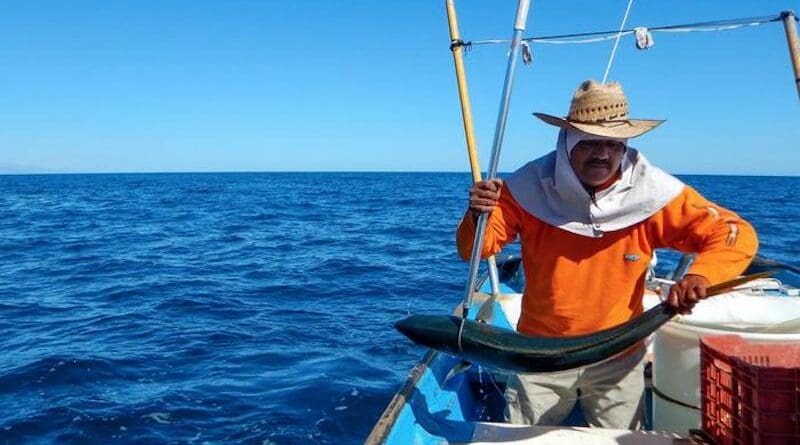Business Operations Affect Fishermen’s Resilience To Climate Change
Timothy Frawley has spent the better of the past two decades working in and around commercial fisheries. Born and raised in Casco Bay, Maine, he grew up packing lobsters and pitching bait on Portland’s working waterfront. He has worked in commercial fisheries in California, Alaska and the Mexican state of Baja California Sur.
Throughout his years spent on working waterfronts, Frawley, a postdoctoral researcher affiliated with the University of Maine’s Darling Marine Center, closely observed the ways in which fishermen conducted their business, making decisions about what and how they fished, and how it affected their operations and profit.
“While the desert of northwest Mexico and the rocky coast of Maine might seem to be worlds apart, I found surprising similarities between the coast of Baja and the coast of Maine,” Frawley reflected. “Both places include communities that are quite remote with local cultures and traditions defined by people’s strong and enduring connections to the ocean.”
With extensive knowledge of commercial fishing and observational and investigative skills he’s refined over the years, Frawley led an international team of researchers to determine how fishermen’s operational decisions affected their ability to adapt to climate change, a global force threatening their livelihoods.
In their new study published in the journal Global Environmental Change, researchers found that fishermen’s responses to a changing climate can be strongly influenced by how they fish and how they’re organized. The study highlights the role that distinct strategies associated with different group sizes and levels of cooperation play in how fishers respond and adapt to climate change.
“Climate variability and change in ocean ecosystems create challenges for fisheries’ sustainability, both economically and environmentally,” said Frawley, a postdoctoral researcher affiliated with the University of Maine Darling Marine Center. “While we know quite a bit about how individual fishermen and coastal fishing communities are responding to changing oceans, less is known about how the social structures through which they choose to organize themselves may influence their vulnerability to associated shocks and stressors and their capacity to adapt.”
Understanding factors that enhance fishers’ ability to adapt to environmental variability and change is critical. Coastal communities worldwide, including many fishing-dependent communities in Maine, are challenged by impacts of the climate crisis, including rising seas, reduced access to working waterfronts, shifting ranges of economically important species and rapidly changing technologies and economic conditions.
Frawley conducted this research while working as a postdoctoral research associate affiliated with the University of California Santa Cruz, NOAA’s Southwest Fisheries Science Center and UMaine. Together with collaborators at UMaine, Stanford University, Stockholm University, University of Rhode Island, Duke University, Oregon State University, Universidad Autónoma de Baja California, Sociedad de Historia Natural Niparajá, Scripps Institution of Oceanography and Comunidad y Biodiversidad (COBI), Frawley synthesized information on how and what people fish throughout northwest Mexico and how those behaviors shifted in the face of changing ocean conditions.
Some of these fishers belong to cooperatives, while others worked as independent owner-operators or as part of businesses backed by private capital from patrons. The regular “fish-tickets” through which fishers are required to report their harvests to the Mexican government provided the team an opportunity to examine how fishing strategies differed among business types before and after a series of marine heatwaves, and what it meant for the profitability of each.
The results indicate that while fishers working as part of cooperatives can be resilient to short-term environmental shocks, the narrow scope of the species they target may increase their vulnerability as climate change progresses. In many ways, small-scale cooperative fishers on the Pacific Coast of Baja California are becoming more and more like their counterparts in Maine and California. As other fisheries have faltered, the harvest of crustaceans such as lobster or Dungeness Crab is becoming increasingly dominant.
This study is part of MAREA+, a long-term interdisciplinary project focused on the environmental and human dimensions of small-scale fisheries in the Gulf of California region. The study was funded by the National Science Foundation and based on more than 10 years of fisheries data collected by fishermen and curated by the Mexican government.
Heather Leslie, a professor of marine sciences at the University of Maine based at the Darling Marine Center, mentored Frawley as part of this project.
“It is really exciting to see how fine-scale information on fishing organizations can illuminate our understanding of responses to climate impacts,” she observed. “It would be great to be able to do this type of analysis in New England, particularly given the growing interest in innovative approaches to fisheries, aquaculture and other dimensions of the blue economy.”

